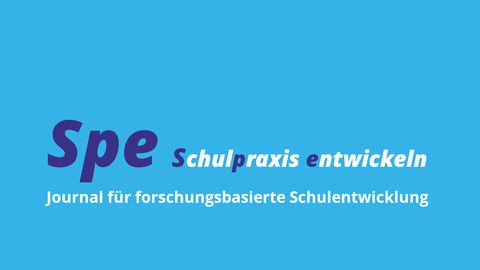Feb 22, 2024
Second edition published: Spe = Developing School Practice. Journal for researchbased school development
The second issue of "Schulpraxis entwickeln - Journal für forschungsbasierte Schulentwicklung" (Spe) has been published. The e-journal was founded in 2022 by Prof. Anke Langner (Chair of Educational Sciences and Head of the University School Research Unit ForUS at TU Dresden) and Dr. Matthias Ritter (ForUS member). "Spe = Developing School Practice" is dedicated to the discourse of research-based school development.
In the current issue, the editors observe that the relationship between science and schools in Germany is still poorly defined: the results of educational research, especially for the development of individual instruments, e.g. for the further training of teachers, follow a top-down logic of transfer. The editors believe that this strategy of change in practice planned by science has failed. As an answer, a second perspective of educational research is presented - using the Dresden University School as an example - in which school development is embedded in school practice and focuses on school structures and processes in the course of longer-term scientific monitoring.
Three of the six published articles were written by teacher training students at TU Dresden and another student project formed the basis for an article in this issue.
- In the first article, Anke Langner and Katja Wiechmann present the youth school as a conceptual element of the Dresden University School trial.
- Anke Langner and Matthias Ritter present the results of a survey on the use of digital media at the university school from the students' perspective in their article with reference to the ICILS Study 2018.
Three articles are based on state examination theses of future teachers:
- Helena Dorothea Zenker's article uses a systematic literature review on the use of standardized tests in the classroom to highlight the gap on the topic of formative learning process support.
- Hanna Wank describes the results of an interview study on parental communication and participation at Dresden University School and aims to derive implications for parental work in schools.
- Against the background of the exemption from grades up to year 8 and the associated feedback concept in the school trial, Tom Börner asked himself: How do students at Dresden University School perceive feedback on their learning processes ? To this end, he conducted and evaluated guided interviews with pupils at Dresden University School.
A final article presents school development counseling in Austria, where it is supported by the teacher training colleges.
- Roland Bernhard and Manfred Fede present a planning instrument (checklist) and an evaluation instrument (guideline) in their article Planning and evaluating the clarification phase of a school development consultation process.
About "Spe = Developing school practice"
The open access journal serves in particular the scientific exchange of innovative (reform) schools by publishing research results and forms of formative educational research.
The focus is on topics of school and organizational development. Empirical and conceptual work on teaching development and professionalization are to be included if they also take into account the school framework conditions in their organizational constitution as well as their changeability in principle.
Permanent call for papers for contributions and guest editorship
"Schulpraxis entwickeln - Journal für forschungsbasierte Schulentwicklung" (Spe) is published in the context of the University School Dresden pilot project founded in 2019, which is being evaluated over 15 years as part of a TU Dresden research project. Prof. Langner, Dr. Ritter and their colleagues will regularly publish findings from the accompanying research of the school experiment.
However, the editors expressly invite colleagues to contribute articles from their areas of research. Contributions can be submitted at any time via a permanent call for papers. In addition, "Spe" offers guest editors the opportunity to design themed issues. The e-journal is published continuously in annual issues.
All issues for download
The first issue of "Spe" contains a collection of articles from 2022 on the topics of "Flexible timetabling" and "Shaping the interaction between school practice and science" as well as studies on the motives behind parents' school choice decisions and reasons for dropping out of school in secondary school.
Further information and the first issue are available for download on the e-journal website: https://journals.qucosa.de/spe
Quocosa is the Saxon document and publication server for free publication and is used in the sense of open access for the verification and long-term archiving of electronic documents. The service is supported by the academic libraries in the Free State of Saxony and is available to all interested authors. The documents are listed in the catalog of the Saxon State and University Library (SLUB), among others.
Cooperation with the Association of University and Experimental Schools
The journal is supported by the Verbund der Universitäts- und Versuchsschulen (VUVS), which was founded in 2020. The VUVS is a network of university locations that strive for closer cooperation between research institutions, teacher training and school practice in very different formats.
The association has set itself the task of "providing a forum for the new movement in order to make scientific support for school reform measures available in terms of content, process and structure".
About University School Dresden
The University School Dresden is a joint project of the City of Dresden and TUD Dresden University of Technology. It is a free, public primary and secondary school funded by the city, where innovative teaching and learning approaches are tested under academic supervision. Furthermore, it serves as a training school for current and future teachers at TU Dresden. The pilot project is being scientifically supervised by the ForUS Research Unit at TU Dresden.
Read more about TU Dresden’s research project: https://tu-dresden.de/gsw/unischule
Read more about the University School Dresden: http://universitaetsschule.org
You can gain a glimpse into daily school life and the research project on social media at @unischuleTUD. Follow the links to see the University School Dresden on Facebook, Twitter, Instagram, YouTube and LinkedIn.
Media inquiries
Maria Neuland Agüero
Tel. +49 351 463-39917
Email: unischule.presse@tu-dresden.de

